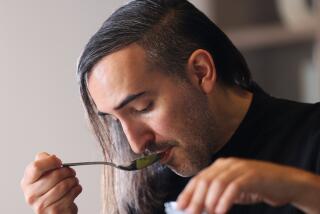‘Born Round: The Secret History of a Full-Time Eater’ by Frank Bruni
- Share via
It’s a good thing Frank Bruni is such a talented writer, or “Born Round: The Secret History of a Full-Time Eater” would be a lot tougher to digest. The outgoing restaurant reviewer for the New York Times writes frankly about gargantuan binges and drastic weight-loss strategies in this alternately rollicking and sobering memoir. A book of comic excesses and culinary appreciation, it ends on a cautiously optimistic note: Bruni mostly has his eating under control, but doesn’t take it for granted.
His passion for food, however, remains undiminished.
Bruni has always loved to eat. The author even suggests he was a baby bulimic, describing in vivid detail the time he threw up all over his highchair after being denied a third burger. Apparently young Bruni continued to regurgitate regularly for a year.
“My parents would later tell me, my friends and anyone else willing to listen that they’d never seen a kid eat the way I ate or react the way I reacted whenever I was denied food,” Bruni writes. “I have no independent memory of this. But according to my mother, it began when I was about 18 months old.”
His Italian American family, which equated abundant food with love, didn’t know what to make of his prodigious appetite. At 8 he and his mother went on their first diet together. The Atkins program didn’t sit too well with his Italian immigrant grandmother, who considered his abstinence a personal affront.
He and his mother held their ground that time, but there would be plenty of times both would falter. Bruni does a good job conveying his family’s complicated relationship with food: His descriptions of competitive family feasts are warm and affectionate. And he avoids blaming his family for his girth, noting repeatedly that neither brother had the same eating problems, although his younger sister had her own weight issues. His parents tried to encourage him in their own way; they were relieved, for example, when he started swimming competitively, rightly figuring that would help keep his weight in check.
But when the family moved from White Plains, N.Y., to Hartford, Conn., Bruni’s commitment to the sport waned. During his teen years, he began experimenting with fasting, and started coming to terms with his homosexuality.
By this point in the book, Bruni’s narrative giddiness has given way to the growing awareness that his compulsive eating is a serious problem. Before long, he’s purging, popping Mexican diet pills and taking laxatives. Bruni keeps the tone light but it’s hard to shake a growing sense of foreboding.
His eating habits get even more grotesque as his newspaper career takes off: Few other writers would be able to pull off similar stories about chicken carcasses piled up in the back of their car, or excessive consumption while on the campaign trail with George W. Bush, without completely grossing out readers. On the campaign trail, Bruni’s weight really balloons, as photos in the book attest. He is dismayed when he weighs in at 268 during a physical.
Prodded by a New York Times colleague, he begins working out with a trainer. When he moves to the Rome bureau, he finally begins to appreciate portion and quality control; he describes himself during that time as “a fairly average guy in his late thirties, maybe fifteen or eighteen pounds over the strict medical ideal for someone just under five feet, eleven inches tall . . . Nothing unusual. Nothing humiliating.” It’s then that the paper offers him the restaurant critic job.
In many ways it’s a dream job for him, but he thinks carefully before accepting. When his editor first asks in a phone call whether he is interested, Bruni bursts out laughing.
“She didn’t appreciate the robust absurdity of what she was asking, the big, fat irony of whom she was asking,” Bruni writes. “Because she had stayed put in New York while I’d moved frequently and traveled widely for the newspaper, she hadn’t laid eyes on me for the better part of a decade. She wasn’t clued in to what had happened to me during that time: the way I’d given in to my crazy hungers and crazier habits; how large I’d grown; how long I’d been trapped at that size, in that sadness; how determinedly I’d slogged my way back to a leaner, better place.”
This job, however, forced Bruni to be even more disciplined about his eating than before. Gourmands will no doubt relish his descriptions of meals at top restaurants.
His stories about disguising his identity are also amusing. Alas, this portion of the book is Bruni’s most self-indulgent: He quotes liberally from his reviews, clearly tickled by his prose, and details a spat with restaurateur Jeffrey Chodorow in unbecoming fashion.
It’s a false note in an otherwise deftly written book. At the outset, he invokes his grandmother’s saying -- “Born round, you don’t die square” -- to describe his physique, but doesn’t hit readers over the head with the metaphor. Toward the end he ponders whether people can change their nature. His younger brother had. Bruni thought he had, too.
Except he hadn’t. One night’s overindulgence reminded him he’d always have to be careful about his eating. He’s not like everyone else when it comes to gustatory indulgence. Bruni is leaving his reviewing gig to write for the paper’s Sunday magazine. It will be the next test of his resolve and hard-won wisdom.
Garrett writes about books and show business at consumedbymedia.wordpress.com.
More to Read
The biggest entertainment stories
Get our big stories about Hollywood, film, television, music, arts, culture and more right in your inbox as soon as they publish.
You may occasionally receive promotional content from the Los Angeles Times.










